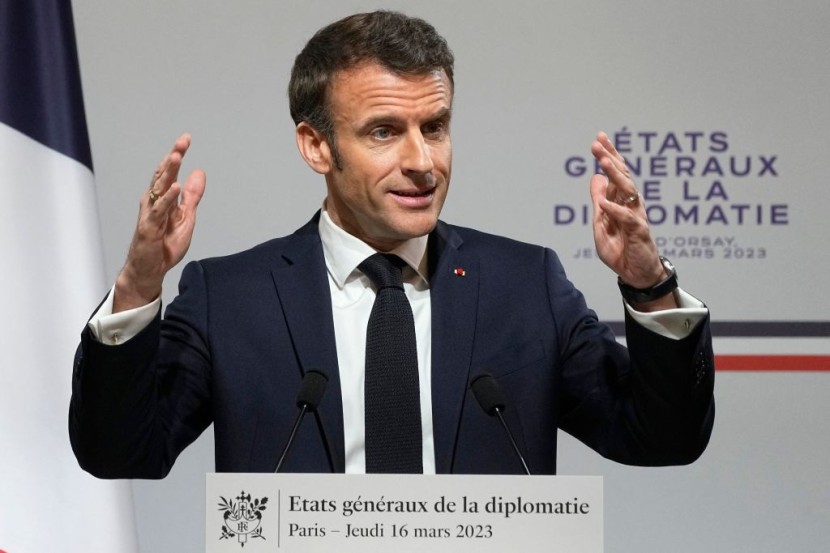
- Within the coming weeks, French President Emmanuel Macron aims to regain the initiative with new reforms
- Macron appeared defiant on Tuesday as his administration narrowly survived a no-confidence vote over an increase in the retirement age
- The French president urged calm as furious protesters maintained pressure on the streets
French President Emmanuel Macron defended his contentious proposal to increase the retirement age as essential to restoring the nation's finances.
Nevertheless, he acknowledged widespread outrage at his government's decision to enact the bill without a parliamentary vote.
Emmanuel Macron Sticks with Pension Bill
That was the first time Macron had addressed the public since his administration pushed the pension law through the legislature and survived the subsequent votes of no confidence.
Since then, nightly small-scale protests have occurred in towns ranging from Paris to Rennes, resulting in over 800 arrests. According to Financial Times, workers' unions have pledged to keep up the pressure with a countrywide march slated for Thursday.
Authorities are closely watching the situation, and 12,000 police officers will be deployed on Thursday as they fear a recurrence of the chaos of the 2018 gilets jaunes demonstrations.
Macron said he recognized the fundamental rights of individuals to demonstrate peacefully but denounced the behavior of certain protestors who intimidated Lawmakers and destroyed their offices.
Strikes continue at garbage collection sites, gasoline refineries, and public transportation services. Wednesday, dockworkers in Marseille blocked entry to France's largest commercial port, preventing automobiles from entering. In response, the government has begun to requisition personnel to remove the 10,000 tons of trash in Paris and to resume gasoline delivery in the south.
Macron stated in a televised discussion with two journalists that he admired "labor unions that maintain their position." Yet, alluding to the threat to democracy posed by a crowd attack on Congress in 2021, he made it plain that he would "not allow any violent excesses."
On the eve of Thursday's scheduled major demonstrations and strikes, his tone was tough and unrepentant. When asked whether he had made any mistakes, Macron said, "Having failed to convince people."
It was the only concession he made on his methods, which included a last-minute appeal to a legal mechanism, article 49.3 of the Constitution, to avoid a full legislative vote on a reform that has divided the nation. His detractors viewed this strategy as anti-democratic, as per NY Times.
Macron stated that it would be simple for him to shirk his obligations and avoid a necessary reform for the country's financial stability and ability to invest in its future. "But, if I must suffer unpopularity today, I will," he remarked.
Read Also : Haiti Gang Wars Claim 187 Lives in 11 Days
France Retirement Age
Macron's justification of his strategy was met with ire by labor groups and opposition parties. He noted, "this change is neither a luxury nor a pleasure; it is a national duty."
To demonstrate his argument, he reverted to a professorial tone, contributing to his perception of him as a distant president. The protests against the retirement age of 64, which aligns France with its European neighbors, have been largely calm over the previous two months, despite the escalation of resentment.
In the last week, violent evening skirmishes between police and protestors have occurred in numerous cities, notably Paris, where riot police shooting tear gas and small groups of protesters burning garbage fires have engaged in repeated pursuits.
Under the French system, the increasing number of pensioners who now live longer are paid for by the current workforce. Even if Macron still needs to persuade the French people of the importance of the proposed reforms, this arrangement looks financially unsustainable in the medium future.
Macron, 45, highlighted that there were 10 million retirees when he began his career, 17 million currently, and 20 million in the near future. He stated that failing to raise the retirement age would equate to "letting our children suffer because you refuse to act with clarity and guts now."
Macron's position on Wednesday that his approach was the only responsible one for the country and future generations was a return to arguments he made last year. In recent months, the official narrative on the pension system has sometimes centered on justice, precarious public finances, and even a left-wing agenda.
Per The Independent, the interview was shown during lunchtime newscasts, which pensioners mostly view as the only demographic not opposed to the reform.
While the opposition has demanded that Macron replace his prime minister, Elisabeth Borne, who has been at the forefront of efforts to draft the law, the president supported her and stated that he had entrusted her with the responsibility. A group of union members watching the interview in Nice needed to be more convinced.
Related Article : Emmanuel Macron Sparks Anger with Retirement Age Bill
@YouTube








